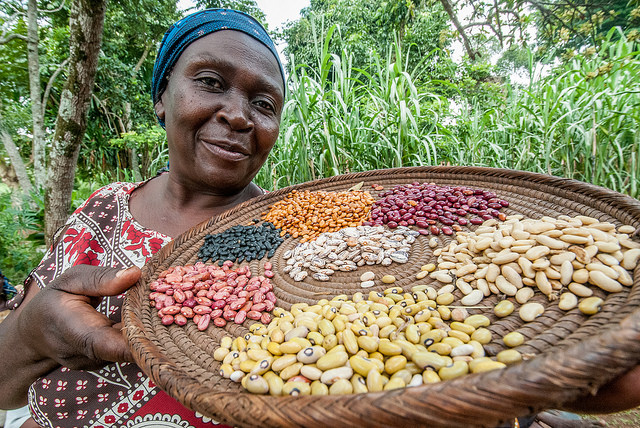
A Ugandan farmer shows 15 varieties of bean seeds. Photo: Georgina Smith / CIAT
We know that what we eat effects our health but something we probably think about less often is how it effects the planet. Research shows that poor diets can be bad for the environment as well as our waist lines. So how can you eat for a healthy body and world?
Despite being essential, agriculture comes at a cost, including in some cases causing pollution, biodiversity loss and high greenhouse gas emissions.
At the same time, increasing rates of obesity and diabetes tell us that the food we are eating is not good for our health. An estimated 35-43 per cent of patients in Australian hospitals are affected by malnutrition, either obesity or under nutrition.
Up until now we haven’t had scientific consensus on how the planet can feed a population of 10 billion people by 2050. We also haven’t had a comprehensive understanding of how food production needs to change to be sustainable.
The EAT-Lancet Commission (a panel of 37 international experts on nutrition, health, sustainability and policy) developed a report on this challenge. The Healthy diets from sustainable food systems report sets out clear, scientific targets for producing higher quality food without depleting the planet’s resources.
Working alongside other international research organisations we have developed global data that provides much needed evidence on how and where our agricultural systems can be more productive and sustainable.
The report recommends radical improvements in the way fertilisers are used; minimising over use and increasing use in regions where fertiliser is under applied. Not only would this increase global food production but also improve the water quality of lakes, rivers and oceans.
The report urges we stop the expansion of new agricultural land at the expense of natural ecosystems and better adapt cropping to environmental conditions.
And not surprisingly, we need to strive hard to reduce greenhouse gas emissions from agriculture.
When it comes to what we’re eating, the report calls for a universal global shift towards healthier diets, with less added sugar and processed foods, and higher consumption of plant foods. In addition, a greater focus on reducing food waste.
The Commission sets out a pathway to achieve healthier and more sustainable food systems. This will not only improve our health but also that of our planet and help us to achieve the UN Sustainable Development Goals and Paris Climate Agreement.


7th February 2019 at 8:58 pm
I agree with Paul completely – “Humanity suffers from the Lemming Syndrome” and will press on in the old manner, refusing to recognise limits until it is too late. I strongly suspect that Thomas Malthus, in his 1798 essay will eventually prove to be correct
7th February 2019 at 3:24 pm
I THINK I heard on BBC /RN , (or Phillip Adams) radio last night – I was almost asleep- that the [small P] president of Brazil is encouraging further intensive Amazon clearing and highways through it. Not only that, but also clearing the native forest dwelling people of the Amazon away, too.
What do we of the Western world do ?? We really do need a form of world governing body that has the ability to over ride and stop decisions made, that go against the well being of the planet. Our life support ! And we of the Western world have enough idiots making very bad decisions within our own county’s environments. I am sure that if our Australian lot {politicians and big business} had control of the Amazon, they’d do to it exactly what they’ve done to the Murray Darling here.
Politicians should keep well away from Country/world/planet environmental issues. It is well above their pay scale and abilities.
10 billion people by 2050. I wonder ? My poor little Grandchildren.
7th February 2019 at 11:45 am
A key aspect of being human is our imagination that gives us the ability to conceive a future that we can aspire to. Feeding a growing global population is achievable in a sustainable manner as long as we are curious enough to ask the right questions and distribute that information and apply it.
7th February 2019 at 11:15 am
Hello Paul,
I disagree with the sort of fatalism that you speak of; I believe it is a.) unhelpful, and b.) not reflective of reality.
The future is open.
Our future is /constrained/ by the present – but it is not /defined/ by the present.
19th January 2019 at 6:28 pm
What’s the point, Humanity suffers from the Lemming Syndrome, and will just keep on expanding until it runs out of resources,, there is nothing to gain in introducing quotas or rations to maximise the population as all it does is delay and maximise the final pain !